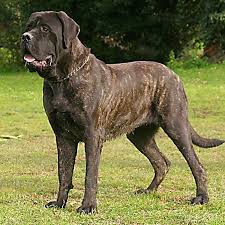
Belgian Mastiff
Conditions of detention
Belgian Mastiffs thrive in rural or suburban environments where they have plenty of space to move and exercise. They are well-suited for homes with large yards and access to open areas.
Useful Fact: Due to their size and strength, they require a secure, fenced yard to ensure they have a safe space to roam and play.
Nutrition and diet
A balanced diet rich in protein and fats is essential for Belgian Mastiffs. High-quality commercial dog food, supplemented with fresh meat and vegetables, supports their large and muscular build.
Useful Fact: Monitoring their food intake and providing joint supplements can help prevent obesity and joint-related issues common in large breeds.
Health
Belgian Mastiffs are generally healthy but can be prone to certain health issues such as hip dysplasia, bloat, and joint problems. Regular veterinary check-ups and maintaining a healthy diet are crucial.
Useful Fact: Regular exercise is important to keep their weight in check and to maintain healthy joints and muscles.
Grooming and care
The Belgian Mastiff has a short, dense coat that requires minimal grooming. Regular brushing helps remove loose hair and keep their coat healthy. Bathing should be done as needed.
Useful Fact: Despite their short coat, Belgian Mastiffs shed year-round, so regular brushing can help manage shedding and keep their coat looking its best.
Education and training
Belgian Mastiffs are intelligent and eager to please, but they can also be stubborn. Early socialization and consistent, positive reinforcement training methods are crucial.
Useful Fact: Due to their size and strength, it is important to start training and socialization early to ensure they grow into well-behaved adults.
Toys and entertainment
Interactive toys, puzzle games, and activities that engage their strength and intelligence are excellent for keeping a Belgian Mastiff mentally and physically stimulated.
Useful Fact: They enjoy activities that involve pulling and carrying, which align with their historical role as draught animals.
Safety
A secure, fenced yard is important for Belgian Mastiffs to prevent them from wandering off. Supervision during outdoor activities is recommended due to their size and strength.
Useful Fact: Their calm and gentle nature makes them good companions for families, but their size means they should be supervised around small children to prevent accidental injuries.
Accessories
Sturdy collars and leashes, comfortable bedding, grooming tools, and interactive toys are essential accessories for a Belgian Mastiff. Crate training can also be beneficial for travel and safety.
Useful Fact: Reflective gear enhances safety during evening or early morning walks, making them more visible to others.
Socialization
Early and ongoing socialization with other dogs, animals, and people is important for Belgian Mastiffs. It helps them develop a well-rounded temperament.
Useful Fact: Regular socialization helps prevent shyness or aggression and ensures they are friendly and adaptable in various situations.
Travel and Transportation
Belgian Mastiffs can adapt to travel if introduced gradually. Secure crates or harnesses in vehicles ensure their safety during trips.
Useful Fact: Bringing familiar items, such as their favorite blanket or toy, can help reduce travel anxiety and make them more comfortable.
Behavior and psychology
Belgian Mastiffs are known for their calm, gentle, and loyal nature. They require regular mental and physical stimulation to prevent boredom and destructive behavior.
Useful Fact: Their strong bond with their family makes them excellent companions, but they can exhibit some independence due to their working background
Legal aspects
Owners should be aware of local regulations regarding pet ownership, including licensing, leash laws, and specific breed regulations.
Useful Fact: Keeping vaccination records and adhering to local pet laws ensures the safety and legality of owning a Belgian Mastiff.


